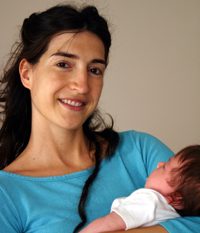Chemistry: a career catalyst Inspire article
Gemma Guilera tells Montserrat Capellas about the joys of her rollercoaster approach to life. Fearlessly, she has started a new life more than once, making her home in very different European cities in the pursuit of a scientific career. Today, she faces a new challenge: motherhood.

Image courtesy of M. Dohler
Noa’s eyes are open, watching her surroundings attentively. Only a month old, she grasps Gemma’s finger and smiles. She seems to be longing to discover the world. Her mother smiles back, perhaps thinking of how far curiosity has already taken her in life.
Gemma, a chemist from Barcelona, Spain, started her career a bit “unexpectedly”. “I was in my last year in secondary school when I made up my mind, thanks to a great chemistry teacher I had. He was very passionate about chemistry, and he transmitted that passion to his students. His explanations were very clear, and his examples were taken from real life experiences rather than coming from textbooks. I chose chemistry just because I like life sciences and thought chemistry would give me a broad view of this discipline with the possibility of changing to biology if I was disappointed,” she explains. In Spain, chemistry students can switch to biology after two years, but the opposite move is not allowed. Gemma combined her interest in chemistry with a desire to discover other cultures, and the fact that she was studying English at the same time led to the first destination in her career adventure: London, UK.
Gemma planned to stay at King’s College in London for a year to do a master’s degree on an ERASMUS/SOCRATES exchangew1. “I wanted to learn other ways of living, and I loved it because everything was so different from what I was used to,” she says. She felt that the teaching methods in the UK were a breath of fresh air after what she had been used to in Spain.

Image courtesy of ESRF
“During my time in London I realised that Spanish students approach their university teachers with fear, whereas Britons have a completely different relationship with the lecturers: they treat each other more as equals.” Science in Gemma’s new country placed much more emphasis on creativity and working independently. “In the UK they encourage you to try out an idea and let you develop your research by yourself,” explains this 32-year-old Catalan. “In Spain, your professor has a field of research and you basically have to follow it,” she adds.
A love of challenge led her to stay in London to carry out a PhD in organometallic chemistry at King’s College. The Anglo-Saxon style (demonstrated by how easy it was to start scientific collaborations in the pub) and the fact that results in a PhD don’t pop up on day one made Gemma feel as though she was on a “rollercoaster, with lots of ups and downs”. There were some moments of despair and stress, such as when a crystal that took a year to make broke on a plane to Germany, where it was going to be analysed; or when the X-ray crystallography machine broke down when she needed it towards the end of her PhD. Today Gemma can appreciate the positive side of her experience: “I can see how much I progressed scientifically and I have matured as a researcher since the beginning of my thesis, and this is really rewarding.”
After her PhD, Gemma faced the real world: the two obvious options were dedicating her time to research or lecturing. “For a lecturer, the responsibility towards the students is huge, and I am not sure I could do a good job,” she explains. On the other hand, research sounded tempting but some fields can be very isolating. “I am a social person, so I wanted to combine research and interaction with people. When I found the job advertisement at the European Synchrotron Radiation Facility [ESRFw2] I was fascinated by it as it was exactly the kind of work I was looking for,” she explains. Of the three CVs she sent to France and three to the UK, only three responded positively: all in France. She was told she was too old for the UK jobs; in Spain it is common to finish a PhD at 28, which was her age at the time.

Image courtesy of ESRF
The career move to the alpine city of Grenoble coincided with the beginning of a new stage in Gemma’s private life: marriage. Her husband, a lecturer in telecommunications, moved with her and found a job as an engineer soon after. Three years later, she is still enjoying her position as a scientist at the ESRF, where she is devoted to research on catalysts for cars, in collaboration with two Japanese car manufacturers.
The aim of this research is to transform toxic gases in automobiles into harmless ones. “The subject is very motivating because it will one day have an application, although it may take several years,” she says.
Gemma is developing and performing new experiments in chemistry, mainly using X-ray absorption spectroscopyw3.
For example, she is exploring how new types of three-way catalysts function under real working conditions. These catalysts simultaneously trigger three reactions:
The reduction of nitrogen oxides to nitrogen and oxygen: 2NOx → xO2 + N2
The oxidation of toxic carbon monoxide to less harmful carbon dioxide: 2CO + O2 → 2CO2
The oxidation of unburnt carcinogenic hydrocarbons to carbon dioxide and water: 2CxHy + (2x+y/2)O2 → 2xCO2 + yH20
By simultaneously using X-ray absorption spectroscopy and other complementary techniques, she can tell something about the mechanism of these reactions, such as how the metal particles interact with the gases, and how this differs with temperature and gas composition.
In addition to her own research, Gemma gives technical and scientific support to visiting users who perform experiments at the ESRF.
The interdisciplinarity of the institute, which combines research in physics, chemistry, biology and other disciplines, its international character and the teamwork are the values she most cherishes in her professional life.
“It is very demanding, and your whole timetable is upside down with respect to the rest of the world (because of long experiments that can keep you awake all night), but if you learn how to manage your time and be efficient when you are working, it is a great job,” Gemma explains. She defines her feelings as a dichotomy: “You get exhausted from it because it is too much work but at the same time you love it because there is so much activity going on.”
Now, Gemma is starting from scratch once more. In June 2006, she became a mother. Maternity is not an easy matter for scientists, and some think it can stop or slow down a career in research. “Coming from Spain, where maternity is frowned upon by employers, and being a first-time mum, I was worried about the reactions of my colleagues. I believe that if I was in Barcelona I may have been passed over for promotion, but here in France everyone respects your family choices and people recognise that you can be a serious scientist and a parent,” she explains.
Gemma’s boss, also a mother, understands her situation perfectly and if she has to leave the lab to take the child to the doctor, for example, it won’t be a problem. Gemma also believes that fathers should not be forgotten: “There should not be any difference between men or women. Both father and mother should have the same rights to be with their child when it is born, but unfortunately it is still not the case in many countries.”
Although Gemma did not move country when she entered this new stage in her life, she feels that motherhood has opened a whole new world to her. “I have to learn a new language; I feel silly because sometimes I do not understand the baby, but it is fun,” she says. “It is difficult to start from scratch, and it gets even harder as you grow up, but it is a challenge that I enjoy.”
Web References
- w1 – To learn more about the ERASMUS exchange programme for students and university teachers, see: http://ec.europa.eu/education/programmes/llp/erasmus/erasmus_en.html
- w2 – For more information about the European Synchrotron Radiation Facility, see: www.esrf.eu
- w3 – A simple explanation of X-ray absorption spectroscopy can be found in:
- Capellas M (2007) Recovering Pompeii. Science in School 6: 14-19.
- A more advanced explanation can be found in this issue:
- Eeckhout, SG (2007) Mercury: a poisonous solution. Science in School 7: 12-15.
Institutions
Review
“Life is a wheel” – that’s what Cypriots used to say, but as Gemma points out, it’s more like a rollercoaster. It turns in different directions, taking you from Barcelona, Spain, to Grenoble, France, via London , UK. It has its ups and downs, successes and disappointments; it spins fast, taking you from student life to a PhD; it changes destination, from a scientific career to motherhood. But somehow it all fits together, in a challenging and fulfilling way, in Gemma’s life. To be inspired, to want to learn, to love what you are doing, to be challenged, to choose, to dare, as Gemma says, makes your life fantastic! That’s how we can all be inspired.
Myrto Pouangare, Cyprus





